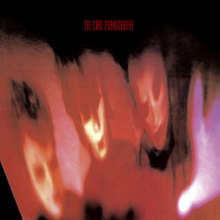| Pornography | ||||
|---|---|---|---|---|
 | ||||
| Studio album by | ||||
| Released | 4 May 1982 | |||
| Recorded | January–April 1982 | |||
| Studio | RAK, London | |||
| Genre | ||||
| Length | 43:30 | |||
| Label | Fiction | |||
| Producer |
| |||
| The Cure chronology | ||||
| ||||
| Singles from Pornography | ||||
| ||||
Pornography is the fourth studio album by English rock band the Cure, released on 4 May 1982[7] by Fiction Records. Preceded by the non-album single "Charlotte Sometimes", it was the band's first album with new producer Phil Thornalley, and was recorded at RAK Studios from January to April 1982. The sessions saw the band on the brink of collapse, with heavy drug use, band in-fighting, and frontman Robert Smith's depression fueling the album's musical and lyrical content. Pornography represents the conclusion of the Cure's early dark, gloomy musical phase, which began with their second album Seventeen Seconds (1980).[8]
Following its release, bassist Simon Gallup left the band, and the Cure switched to a much brighter and more radio-friendly new wave sound.[9] Although it was poorly received by critics at the time of release, Pornography was the Cure's most popular album to date, reaching number eight on the UK Albums Chart. It has since gone on to gain acclaim from critics, and is now considered an important milestone in the development of the style of music known as gothic rock.
- ^ a b Mason, Stewart. "Pornography – The Cure". AllMusic. Archived from the original on 24 July 2018. Retrieved 21 March 2018.
- ^ Reynolds 2005, p. 429.
- ^ 21 March 2013. 13 Best Goth Albums of All Time Archived 2020-08-23 at the Wayback Machine. Spectrum Culture.
- ^ Jackson, Josh (13 July 2016). "The 50 Best Post-Punk Albums". Paste. Archived from the original on 18 August 2018. Retrieved 26 August 2016.
- ^ Kellman, Andy. "808s & Heartbreak – Kanye West". AllMusic. Retrieved 17 January 2020.
Several tracks have almost as much in common with irrefutably bleak post-punk albums, such as New Order's Movement and the Cure's Pornography...
- ^ Marszalek, Julian. "A Vision Of Hell: The Cure's Pornography As Psychedelic Post Punk Masterpiece". The Quietus. Retrieved 13 March 2024.
- ^ "The Cure Official Site".
- ^ Reynolds, Simon (2005). "Chapter 22 – Dark Things: Goth and the Return of Rock". Rip It Up and Start Again: Postpunk 1978–1984. Faber and Faber. p. 429. ISBN 0-571-21569-6.
- ^ Apter, Jeff (2006). Never Enough: The Story of The Cure. Omnibus Press. ISBN 1-84449-827-1.